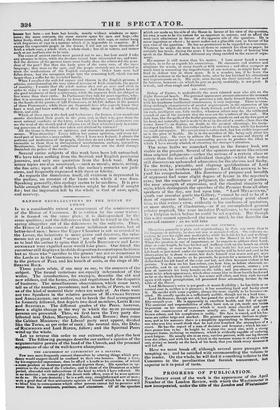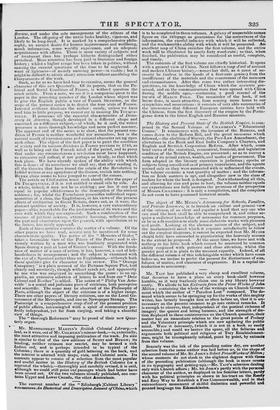PROGRESS OF PUBLICATION.
THE literary event of the week is the appearance of the April Number of the London Review, with which the Westminster is now incorporated, under the title of the London and Westminster Review, and under the sole management of the editors of the London. The offspring of the union looks healthy, vigorous, and
likely to be long-lived. It is marked by a comprehensive philo- sophy, an earnest desire for human improvement and wellbeing, much information, some worldly experience, and an adequate acquaintance with affairs. There is more variety of subjects and of treatment than has perhaps hitherto distinguished either periodical. More attention has been paid to literature and foreign history ; whilst a higher range has been taken in politics, without causing the current questions of the time to he neglected. A want of lightness—of merely amusing power—is visible ; but it might be dillicult to attain showy attraction without sacrificing the iliosyncracies of the work. Such, so far as we have had time to examine, seems the general • character of this new Quarterly. Of its papers, that on the Po- litical and Social Condition of France, is without question the
crack article. From a note, we see it is a companion-piece to the paper in the preceding number of the London whose object was to give the English public a view of French literature, as the scope of the present series is to depict the true state of France. Internal evidence discloses the author : surely, unless we have read him to little purpose, we cannot err in naming DE TOCQUE- VILLE. It possesses all the essential chatacteristics of Demo- cracy in America, though developed in a different shape and exercised on a different subject,—of which, be it said, the writer possesses a more thorough knowledge and more perfect mastery. The apparent end of the series is to show, that the present con- dition of France is neither wonderful nor anomalous, but is the natural result of circumstances and national character acting upon each other. The object of the first paper is to paint the condition of scciety and its various divisions in France previous to 1789, as well as to bring out the French mind of the period, and to prove that under any circumstances a revolution must have happened, as extensive and radical, if not perhaps so bloody, as that which took place. We have already spoken of the ability with which this is done : of its soundness we shall say, that after reading it, all the theories that have traced the origin of the Revolution to Infidel writers or any symptoms of the disease, vanish into nothing. BURKE alone seems to have jumped to some of the causes. The article on Civilization must rank closely after the paper of DE TOCQUEVILLE, if it is not entitled to stand side by side. As a whole, indeed, it may not be so striking ; nor has it any part equal in popular effectiveness to the description of the ancient noblesse ; fur, whilst the Frenchman personifies individual repre- sentatives of a class, the Englishman, in his views of the present effects of civilization in Great Britain, draws out, as it were, the abstract qualities of society. It is, however, a very extraordinary paper—alike remarkable for the profoundness of its views and the ease with which they are expressed. Such a combination of the essence of pol:tical science, extensive learning, reflection upon the past and observation upon the present, with speculation as to the future, bus rarely appeared. Each of these articles contains the matter of a volume. Of the other papers we have read, several may be mentioned for some characteristic quality. The notice of the " Memoirs of Godoy " takes a favourable view of the Prince of the Peace; and is ob- viously written by a man who was familiarly acquainted with Spain during a part at least of Gonov's career. With the fresh- ness of matter of a man of action, it has, however, a sort of left- handedness in arrangement ; and the subject is examined with the eye of a Spaniard rather than an Eitglishman,—although both these qualities give its character to the review. The " Orange Conspiracy" is a plain account of the Portman Square Plot, told clearly and succinctly, though without much art, and apparently by one who was employed in unearthing the game : in an ap- pendix, an extensive selection of letters to and from our" Dear Colonel and Brother" is added. The notice of " Philip Van Arte- velde " is a sound and judicious piece of criticism, both perceptive and scientific. The same may be observed of the Philosophy of Poets, although the object of the criticism is of a higher range. 'There are other papers of literary criticism, one on the Local Go- vernment of the Metropolis, and one on Newspaper Stamps. The Postscript is a comprehensive coup d'acil of the present position of public affairs, intermingled with a spirit of commentary per- fectly independent, yet far from carping, and taking a cheerful view of things.
The " thorough Reformers" may be proud of their new Quar- terly organ.



























 Previous page
Previous page